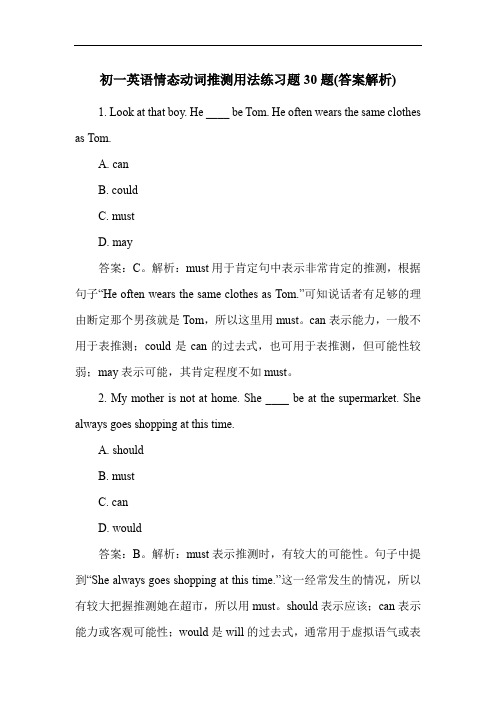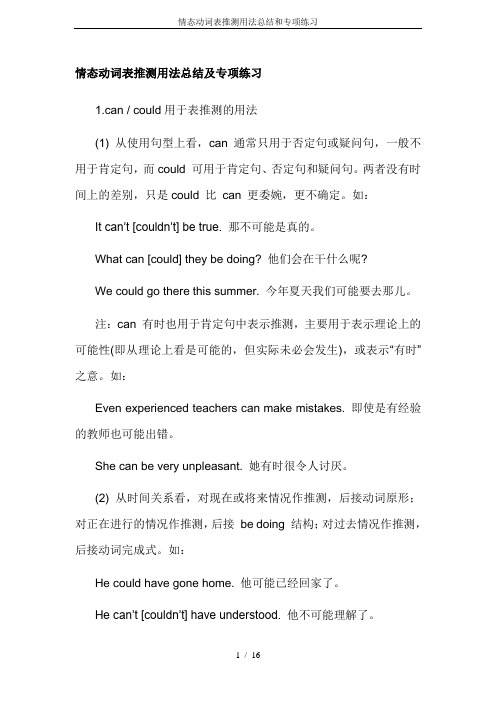2015情态动词表推测的讲解及练习题
初一英语情态动词推测用法练习题30题(答案解析)

初一英语情态动词推测用法练习题30题(答案解析)1. Look at that boy. He ____ be Tom. He often wears the same clothes as Tom.A. canB. couldC. mustD. may答案:C。
解析:must用于肯定句中表示非常肯定的推测,根据句子“He often wears the same clothes as Tom.”可知说话者有足够的理由断定那个男孩就是Tom,所以这里用must。
can表示能力,一般不用于表推测;could是can的过去式,也可用于表推测,但可能性较弱;may表示可能,其肯定程度不如must。
2. My mother is not at home. She ____ be at the supermarket. She always goes shopping at this time.A. shouldB. mustC. canD. would答案:B。
解析:must表示推测时,有较大的可能性。
句子中提到“She always goes shopping at this time.”这一经常发生的情况,所以有较大把握推测她在超市,所以用must。
should表示应该;can表示能力或客观可能性;would是will的过去式,通常用于虚拟语气或表示过去的习惯,这里均不符合语境。
3. There are a lot of clouds in the sky. It ____ rain soon.A. canB. mayC. mustD. should答案:B。
解析:may表示可能性,天空中有很多云只是有下雨的可能性,但不是肯定会下雨。
can表示能力或客观可能性时,通常不用于这种表天气变化的推测;must表示肯定的推测,这里根据云的情况不能肯定一定会下雨;should表示应该,不符合此处语境。
4. The book on the desk ____ be Lily's. Her name is on it.A. canB. mayC. mustD. could答案:C。
情态动词表推测用法总结及专项练习

情态动词表推测用法总结及专项练习第一篇:情态动词表推测用法总结及专项练习情态动词表推测用法总结及专项练习1.can / could用于表推测的用法(1)从使用句型上看,can 通常只用于否定句或疑问句,一般不用于肯定句,而could 可用于肯定句、否定句和疑问句。
两者没有时间上的差别,只是could 比 can 更委婉,更不确定。
如:It can’t [couldn’t] be true.那不可能是真的。
What can [could] they be doing? 他们会在干什么呢? We could go there this summer.今年夏天我们可能要去那儿。
注:can 有时也用于肯定句中表示推测,主要用于表示理论上的可能性(即从理论上看是可能的,但实际未必会发生),或表示“有时”之意。
如:Even experienced teachers can make mistakes.即使是有经验的教师也可能出错。
She can be very unpleasant.她有时很令人讨厌。
(2)从时间关系看,对现在或将来情况作推测,后接动词原形;对正在进行的情况作推测,后接 be doing 结构;对过去情况作推测,后接动词完成式。
如:He could have gone home.他可能已经回家了。
He can’t [couldn’t] have understood.他不可能理解了。
Why does he know this? Can [Could] someone have told him about it? 他怎么知道? 会是哪个人告诉他了吗?(3)“could+完成式”除表示对过去的推测外,还有以下重要用法:① 表示过去没有实现的可能性,常译为“本来可以”。
如: I could have lent you the money.Why didn’t you ask me? 我本来可以借这笔钱给你的。
初一英语情态动词推测用法练习题40题含答案解析

初一英语情态动词推测用法练习题40题含答案解析1.There must be a lot of students in the library. It's very quiet.must becan't bemight becould be答案解析:must be。
“must be”表示肯定的推测,意思是“一定是”。
图书馆很安静,通常情况下安静的地方可能有很多学生在学习,所以用“must be”比较合理。
“can't be”表示否定的推测,不符合题意。
“might be”和“could be”表示可能性较小的推测,没有“must be”肯定。
2.The boy in the classroom must be Tom. He is the only one who wears a blue shirt today.must becan't bemight becould be答案解析:must be。
题干中明确指出男孩是唯一穿蓝色衬衫的人,所以肯定是Tom,用“must be”。
“can't be”否定推测不符合。
“might be”和“could be”可能性小,不如“must be”确定。
3.There must be some books on the desk. I saw the teacher put them there.must becan't bemight becould be答案解析:must be。
看到老师把书放在桌子上了,所以肯定有书在桌子上,用“must be”。
“can't be”不对。
“might be”和“could be”表示不确定,这里已经确定看到老师放书了。
4.The girl who is singing must be Lily. She has a beautiful voice.must becan't bemight becould be答案解析:must be。
情态动词表推测的讲解及练习题讲课稿

表推测时,英语中只使用must,may,might,may not和can't。
这五个表达的语气依次递减:must:一定(语气肯定)可能性最大may might ;can could 可能不确定可能性不大may not:也许不(表否定)can't:一定不;不可能(must的反义)可能性为零推测现在的事情用must,may,might,may not和can't+do或bee.g.She must be at home now. The boy may play now.推测过去的事情用must,may,might,may not和can't+have donee.g.She might have been ill yesterday. He must have hold the party.情态动词must, can, could, may, might表推测的用法情态动词中的must, can, could, may, might都表推测。
其中must的可能性最大,can / could 次之,may / might最小。
具体用法如下:1.must的用法(1)表示推测“可能性”时,意思是“一定、准是”,语气较肯定,较有把握。
He must be American. = It is certain that he is American. 他准是个美国人。
(2)must表推测只能用于肯定句。
如果要表示“一定不、肯定不”的意思时,应用can’t,如询问某种可能时,应用can。
He must know my address. 他肯定知道我的地址。
(一定)He can’t know my address. 他肯定不知道我的地址。
(一定不)Can he know my address? 他知道我的地址吗?(询问可能性)(3)must表示推测时,可以推测现在/正在发生的动作/过去发生的动作。
初一英语情态动词推测用法练习题30题(带答案)

初一英语情态动词推测用法练习题30题(带答案)1. The door is open. Someone ____ be in the room.A.mustB.canC.mayD.could答案解析:C。
“must”表示肯定的推测,语气非常强;“can”表示理论上的可能性;“may”表示有可能,语气较弱;“could”表示过去的可能性或委婉语气。
在这个场景中,门开着只能说明可能有人在房间,所以选择“may”。
2. There is a lot of noise coming from the classroom. The students ____ be having a discussion.A.mustB.canC.mayD.could答案解析:A。
“must”在这里表示比较肯定的推测,因为有很多噪音从教室传来,很有可能是学生们在进行讨论。
“can”和“could”表示可能性较小,“may”语气较弱。
3. Tom is not in the classroom. He ____ be in the library.A.mustB.canD.could答案解析:C。
“may”表示有可能,因为汤姆不在教室,只是有可能在图书馆,不能确定,所以选择“may”。
“must”语气太强,“can”和“could”也不太符合这个场景。
4. The light in the office is on. Someone ____ be working there.A.mustB.canC.mayD.could答案解析:C。
灯亮着只能说明有可能有人在办公室工作,“may”语气较弱,符合这个场景。
“must”太肯定,“can”和“could”也不太恰当。
5. There are some footprints on the ground. Someone ____ have walked here.A.mustB.canC.mayD.could答案解析:C。
情态动词表推测用法总结和专项练习

情态动词表推测用法总结及专项练习1.can / could用于表推测的用法(1) 从使用句型上看,can 通常只用于否定句或疑问句,一般不用于肯定句,而could 可用于肯定句、否定句和疑问句。
两者没有时间上的差别,只是could 比can 更委婉,更不确定。
如:It can’t [couldn’t] be true. 那不可能是真的。
What can [could] they be doing? 他们会在干什么呢?We could go there this summer. 今年夏天我们可能要去那儿。
注:can 有时也用于肯定句中表示推测,主要用于表示理论上的可能性(即从理论上看是可能的,但实际未必会发生),或表示“有时”之意。
如:Even experienced teachers can make mistakes. 即使是有经验的教师也可能出错。
She can be very unpleasant. 她有时很令人讨厌。
(2) 从时间关系看,对现在或将来情况作推测,后接动词原形;对正在进行的情况作推测,后接be doing 结构;对过去情况作推测,后接动词完成式。
如:He could have gone home. 他可能已经回家了。
He can’t [couldn’t] have understood. 他不可能理解了。
Why does he know this? Can [Could] someone have told him about it? 他怎么知道? 会是哪个人告诉他了吗?(3) “could+完成式”除表示对过去的推测外,还有以下重要用法:①表示过去没有实现的可能性,常译为“本来可以”。
如:I could have lent you the money.Why didn’t you ask me? 我本来可以借这笔钱给你的。
你为什么不向我提出?②用来委婉地责备某人过去应该做某事而没有去做,常译为“本来应该”。
中考英语情态动词推测基础运用练习题30题含答案解析
中考英语情态动词推测基础运用练习题30题含答案解析1.There must be someone in the classroom. The light is on.A.canB.mustC.mightD.could答案解析:B。
“must”在这里表示肯定的推测,语气最强,因为灯亮着,所以很肯定教室里有人。
“might”和“could”表示可能性较小的推测,“can”一般表示能力或可能性,在这里不太符合语境。
2.She can't be at home. She has gone to school.A.mustB.can'tC.mayD.could答案解析:B。
根据后一句“她去学校了”可知她肯定不在家,“can't”表示否定的推测,语气较强。
“must”表示肯定推测,这里不合适;“may”和“could”表示可能性较小的推测,也不符合。
3.The boy in blue look very tired. He must have stayed up late last night.A.mustB.can'tC.may答案解析:A。
“must”在这里表示肯定的推测,语气较强,因为男孩看起来很累,所以推测他昨晚肯定熬夜了。
“can't”表示否定推测,不符合;“may”和“could”可能性较小,没有“must”符合语境。
4.There may be some books on the desk.A.mustB.mayC.can'tD.could答案解析:B。
“may”表示可能性的推测,语气较弱。
“must”表示肯定推测,这里不确定书一定在桌子上;“can't”表示否定推测;“could”也表示可能性较小,但没有“may”正式。
5.He might be at the library.A.mustB.can'tC.mayD.might答案解析:D。
高考英语情态动词推测运用练习题20题
高考英语情态动词推测运用练习题20题1.He is always reading books. He must be very interested in literature.A.mustB.mayC.mightD.could答案:A。
“must”在这里表示肯定的推测,语气最强。
他总是在读书,所以一定对文学很感兴趣。
“may”“might”“could”虽然也可以表示推测,但语气较弱,不符合这里的语境。
2.She has a lot of knowledge about art. She could be an art major.A.mustB.mayC.mightD.could答案:D。
“could”在这里表示比较委婉的推测。
她有很多关于艺术的知识,有可能是艺术专业的。
“must”语气太强硬,“may”“might”也可以表示推测,但不如“could”委婉。
3.The man is wearing a suit and tie. He might be going to a formal event.A.mustB.mayC.might答案:C。
“might”在这里表示比较弱的推测。
这个男人穿着西装打着领带,可能是要去一个正式的活动。
“must”语气太肯定,“may”“could”也可以表示推测,但“might”更符合语境。
4.The room is very clean. She may have cleaned it.A.mustB.mayC.mightD.could答案:B。
“may”在这里表示有可能的推测。
房间很干净,她有可能打扫了。
“must”语气太强硬,“might”“could”也可以表示推测,但“may”更符合语境。
5.There are many books on the desk. He could be a student.A.mustB.mayC.mightD.could答案:D。
情态动词表推测的讲解及练习题
情态动词表推测的讲解及练习题内部编号:(YUUT-TBBY-MMUT-URRUY-UOOY-DBUYI-0128)九年级英语表推测语气的讲解与练习表推测时,英语中只使用must,may,might,may not和can't。
这五个表达的语气依次递减:情态动词must, can, could, may, might表推测的用法情态动词中的must, can, could, may, might都表推测。
其中must的可能性最大,can / could次之,may / might最小。
具体用法如下:的用法(1)表示推测“可能性”时,意思是“一定、准是”,语气较肯定,较有把握。
He must be American. = It is certain that he is American. 他准是个美国人。
(2)must表推测只能用于肯定句。
如果要表示“一定不、肯定不”的意思时,应用can’t,如询问某种可能时,应用can。
He must know my address. 他肯定知道我的地址。
(一定)He can’t know my address. 他肯定不知道我的地址。
(一定不)Can he know my address 他知道我的地址吗(询问可能性)(3)must表示推测时,可以推测现在/正在发生的动作/过去发生的动作。
He must have a car now. (现在)他一定有辆小汽车。
He must be doing his exercises in the classroom.(正在进行)他一定在教室里做练习。
He must have finished the work.(过去发生)他一定已完成了工作。
注:must表示推测时很少用于将来的情况。
一般不用He must come tomorrow.可用It`s certain / I’m sure that he will come tomorrow.(4)在反意疑问句中,当附属部分含有表示推测意义的must时,疑问部分的助动词应与must后面的动词在非推测情况下的用法保持一致。
情态动词表推测用法讲解及配套练习
情态动词表推测用法讲解及配套练习编辑整理:尊敬的读者朋友们:这里是精品文档编辑中心,本文档内容是由我和我的同事精心编辑整理后发布的,发布之前我们对文中内容进行仔细校对,但是难免会有疏漏的地方,但是任然希望(情态动词表推测用法讲解及配套练习)的内容能够给您的工作和学习带来便利。
同时也真诚的希望收到您的建议和反馈,这将是我们进步的源泉,前进的动力。
本文可编辑可修改,如果觉得对您有帮助请收藏以便随时查阅,最后祝您生活愉快业绩进步,以下为情态动词表推测用法讲解及配套练习的全部内容。
情态动词must, can, could, may, might表推测的用法情态动词中的must, can, could, may, might都表推测。
其中must的可能性最大,can / could次之,may / might最小.具体用法如下:1.must的用法(1)表示推测“可能性”时,意思是“一定、准是”,语气较肯定,较有把握。
He must be American。
= It is certain that he is American. 他准是个美国人。
(2)must表推测只能用于肯定句.如果要表示“一定不、肯定不”的意思时,应用can’t,如询问某种可能时,应用can.He must know my address。
他肯定知道我的地址.(一定)He can’t know my address. 他肯定不知道我的地址。
(一定不)Can he know my address?他知道我的地址吗?(询问可能性)(3)must表示推测时,可以推测现在/正在发生的动作/过去发生的动作。
He must have a car now. (现在)他一定有辆小汽车.He must be doing his exercises in the classroom。
(正在进行)他一定在教室里做练习。
He must have finished the work。
- 1、下载文档前请自行甄别文档内容的完整性,平台不提供额外的编辑、内容补充、找答案等附加服务。
- 2、"仅部分预览"的文档,不可在线预览部分如存在完整性等问题,可反馈申请退款(可完整预览的文档不适用该条件!)。
- 3、如文档侵犯您的权益,请联系客服反馈,我们会尽快为您处理(人工客服工作时间:9:00-18:30)。
表推测时,英语中只使用must,may,might,may not和can't。
这五个表达的语气依次递减:must:一定(语气肯定)可能性最大may might ;can could 可能不确定可能性不大may not:也许不(表否定)can't:一定不;不可能(must的反义)可能性为零推测现在的事情用must,may,might,may not和can't+do或bee.g.She must be at home now. The boy may play now.推测过去的事情用must,may,might,may not和can't+have donee.g.She might have been ill yesterday. He must have hold the party.情态动词must, can, could, may, might表推测的用法情态动词中的must, can, could, may, might都表推测。
其中must的可能性最大,can / could 次之,may / might最小。
具体用法如下:1.must的用法(1)表示推测“可能性”时,意思是“一定、准是”,语气较肯定,较有把握。
He must be American. = It is certain that he is American. 他准是个美国人。
(2)must表推测只能用于肯定句。
如果要表示“一定不、肯定不”的意思时,应用can’t,如询问某种可能时,应用can。
He must know my address. 他肯定知道我的地址。
(一定)He can’t know my address. 他肯定不知道我的地址。
(一定不)Can he know my address? 他知道我的地址吗?(询问可能性)(3)must表示推测时,可以推测现在/正在发生的动作/过去发生的动作。
He must have a car now. (现在)他一定有辆小汽车。
He must be doing his exercises in the classroom.(正在进行)他一定在教室里做练习。
He must have finished the work.(过去发生)他一定已完成了工作。
注:must表示推测时很少用于将来的情况。
一般不用He must come tomorrow.可用It`s certain / I’m sure that he will come tomorrow.(4)在反意疑问句中,当附属部分含有表示推测意义的must时,疑问部分的助动词应与must后面的动词在非推测情况下的用法保持一致。
He must be a worker, isn’t he? (现在)他准是个工人,是吗?It must have rained last night, didn’t it?(过去)昨晚一定下雨了,是不是?You must have learned English for many years, haven’t you? (完成时)你一定学了好多年英语,是吗?2.can / could的用法(1)can表示推测“可能性”时,往往用于否定句或疑问句。
Can’t“一定不”,语气很肯定。
can在疑问句中意思是“会、可能”。
用于肯定句时,表示理论上的,潜在的可能性(有倾向,实际上未必会发生或者不涉及实际是否发生)往往与sometimes 或者someone 有关。
Accidents can happen.He can’t be at home. = It is impossible that he is at home. 他一定不在家。
(2)can /can’t后可接进行时/完成时,表示对现在发生的动作或过去发生的动作进行推测。
They can’t be reading in the library. 他们一定不在图书馆读书。
He can’t have gone to Shanghai for I saw him a minute ago.他不可能去了上海,我刚才还看见他。
It’s so late. Where can she have gone? 天晚了,她可能去哪儿了呢?(3)在反意疑问句中,当陈述部分含有表示推测意义的can’t时,疑问部分的助动词应与can’t后面的动词在非推测情况下的用法保持一致.He can’t be a teacher, is he? 他不是教师,是吗?She can’t have finished her homework, has she? 她一定没有完成家庭作业,是不是?could可用于表示某事有可能发生表示可能性不大的推测。
意思相当于may/mightDon’t eat it. It could be poisonous. 不要吃它,可能有毒。
The plane could be delayed by fog. 飞机可能会因为雾晚点。
(5)could还可以用于表示客气、委婉、礼貌的请求语气。
Excuse me, could you tell me the way to the bus station?Could you help me?(6)couldn’t表示否定推测,表示某事不可能真实,或由于特定事实或环境某事肯定不会发生。
It couldn’t possibly be poison. 这不可能是毒药。
表示对过去发生的事推测,常常和have done 连用He was not at home last night . He could/ might have gone to movies.I didn't see her at the meeting yesterday; she couldn't have spoken at the meeting.3. may和might的用法(1)may, might表示推测“可能性”时,意思是“可能”、“也许”,语气没有must肯定。
He may / might be American. = It is possible that he is American.他可能是个美国人。
注:might不表示过去时态,只是语气上比may更委婉,表示的可能性更小。
(2)may, might表推测时,可以用于否定句,意思是“可能不、也许不”,但不用于疑问句。
He may / might not be at home. 他也许不在家。
(3)may, might可以推测现在正在发生的动作或过去发生的动作。
He may / might be sleeping now. (现在)他可能正在睡觉。
The boy may / might not be watching TV at home. (现在)这个男孩可能没在家看电视These students may / might have seen the film before.(过去)这些学生以前可能看过这部电影。
(4)may, might还可以推测将来的情况。
I think we should take raincoat with us, it may rain.我想我们应该带上雨衣,可能要下雨了。
She might not come this afternoon. 她今天下午可能不来一、单项选择1 John___ come to see us tonight, but he isn't very sure yet.A. mayB. needC. can’tD. must2 John isn’t in the classroom. H e _______ play soccer on the playground with Bob.A. canB. mustC. shouldD. can’t3 That _______not be her husband . She is still single.A. mayB.canC. couldD. might4 You___ go and see a doctor at once because you got a fever.A. canB. mustC. dareD. would5 -Can you speak Japanese? -No, I____.A. mustn'tB. can'tC. needn'tD. may not6 -He___ be in the classroom, I think.-No, he ___ be in the classroom. I saw him go home a minute ago.can; may not B. must; may not C. may; can't D. may; mustn't7 -Is Lena swimming in the pool?-No, she swim. She is terrified of water.A. may notB. must notC. can'tD. needn't8 He isn't at school. I think he ___ be ill.A. canB. shallC. mustD. might9 -What do you think “upset” means?- I’m not sure. It mean “sad”.may B. must C. can D. should10 The children___ play football on the road.can't B. canC. mustn'tD. must11.The road is wet . It ______last night.A must rainB must have rainedC could have rainedD can have rainedHe ______you more help , even though he was busy .A might have givenB might not giveC may not have givenD may give答案ABBBB CCDAA BA。
